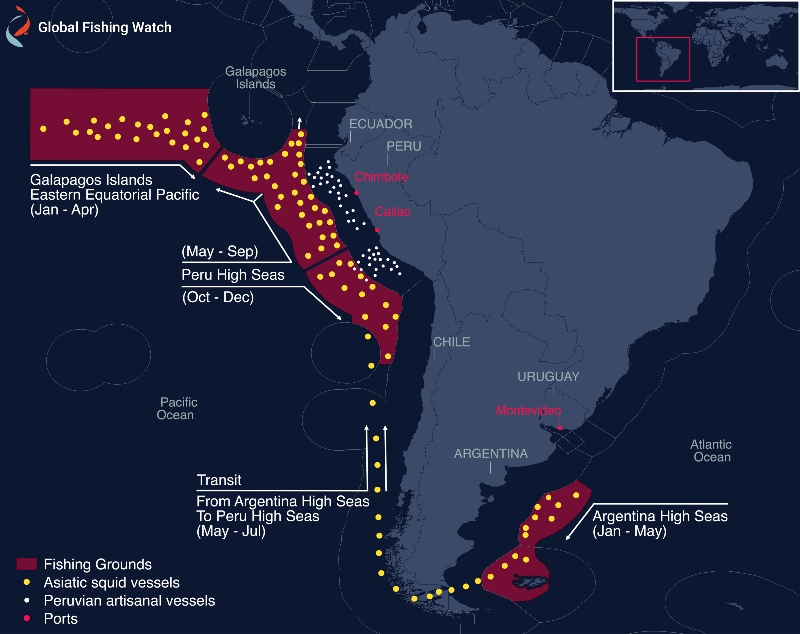Are sustainable practices like squid fishing moratoriums working?
Interested in this FREE data set?
AIS tracks of Chinese fishing vessels during fishing moratoriums in the South-West Atlantic and South East-pacific. Are they working?
There was a lot of talk this year about Chinese squid fishing on both the east and west coast of South America. In recent years increasing concerns about overfishing and developing more sustainable fishing practices led to new sanctions and moratoriums. But are the sanctions working and will they result in more sustainable long term fishing practices?

Lit-up fishing boats seen from space – Source: NASA Earth Observatory
Why Are Moratoriums Necessary?
Fishing vessels light up the night skies with a green glow of lights to attract plankton and squid. The emerald green glow is often captured in satellite images and it paints a clear picture of how vast the fishing industry is. What isn’t instantly clear from these satellite images is how in need of restoration our ocean populations are due to overfishing and pollution. For years, the maritime industry has struggled to shine a light on vessels that choose to turn off their AIS transponder and ‘go dark.” These dark vessels often have ties to illicit and illegal activities that range from human trafficking to illegal fishing. One fishing activity at the center of the dark vessel controversy is squid fishing. The trade commodity is highly prized and in high demand around the world. Chinese fishing vessel operators are eager to meet this demand and account for about 70 percent of the global catch of giant squid. So eager, in fact, that the stock of squid in the oceans is in need of replenishment and is the subject of ecosystem restoration.
Protecting Fish Populations
To protect fish populations in the future, fishing moratoriums have been put in place and tighter sanctions have been levied on fishing vessels found breaking this moratorium. Yet, there is speculation that these sanctions and moratoriums are being broken and going dark is linked to this activity. Dark vessels contribute significantly to overfishing and illegal fishing ventures that have wiped out ocean ecosystems. Both fishing vessels and reefers, refrigerated cargo ships often used for transshipping, can selectively turn off their AIS transponders, accomplish an illegal task and turn it back on again. Vessel operators cite competition as a reason for turning off their AIS transponders, but this activity has a long history of unscrupulous activities.

Squid fleet route between the Pacific Ocean and South Atlantic Ocean. © Global Fishing Watch
Building More Sustainable Industries by Focusing on the Largest Fleets
Given the long history of illegal activities, regulations for China’s massive fishing fleets were significantly changed this year. These changes include tougher penalties for both captains and companies caught fishing in an area that is under a fishing moratorium. There are also new revisions to the Distant-Water Fishing Management Regulations, new Management Measures for High Seas Squid Fishery, and a new Rule for High Seas Transshipment in addition to changes in the Administrative Measures of the Vessel Monitoring System. The hope is that these revisions and stricter penalties will decrease illegal activities and promote sustainable practices.
Is It Working?
We gathered our AIS data to check in on Chinese fishing fleets in the southwest Atlantic Ocean to see what the vessel traffic looked like. This stretch of ocean is a squid spawning ground. Here’s what we found:
Chart 1
Chart 1 shows the number of fishing vessels in the southwest Atlantic Ocean (32°S – 44°S, 48°W – 60°W) separated by flag, tracking Chinese, Indian, and Vietnamese vessels.
Chart 2
Chart 2 shows the sharp decrease in Chinese fishing vessels in the southwest Atlantic Ocean from July – September which is the squid fishing moratorium. This chart indicates that Chinese fishing vessels are adhering to the moratorium.
Chart 3
Chart 3 is taken during phase 2 of the moratorium in similar spawning grounds in the high seas of the East Pacific Ocean between (5°N-5°S, 110°W-95°W) from September 1 to November 30.
Chart 4
Chart 4 again shows the sharp decline of Chinese fishing vessels in a moratorium area, indicating that the new sanctions and moratoriums are being adhered to and might have a greater impact on ocean restoration in the future.
It’s a start
More sanctions and moratoriums are being encouraged and enforced to promote global, sustainable fishing practices. AIS data is a great way to demonstrate that these practices are being respected. The above charts indicate the moratorium is being respected by Chinese vessels and we have seen little evidence of large amounts of dark vessels in the area during the moratorium, but our engineers will dig deeper into where the vessels went once the Moratorium started, and we will report back on this soon.